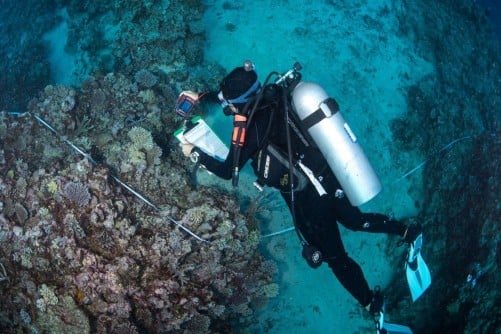UPDATE: The Wildlife Conservation Society (WCS) has been awarded $2 million from the Bezos Earth Fund as part of its urgent initiative to combat climate change and biodiversity loss. This funding, announced on October 23, 2025, will accelerate the development of artificial intelligence solutions aimed at monitoring and protecting coral reefs worldwide.
The WCS is one of fifteen global teams selected for the Bezos Earth Fund’s AI for Climate and Nature Grand Challenge. With this funding, WCS will leverage AI and citizen science to revolutionize coral reef conservation, targeting the most climate-resilient reefs that are crucial for sustaining biodiversity and supporting coastal communities.
Dr. Emily Darling, Director of Coral Reef Conservation at WCS, stated,
“This award helps us turn AI innovation into real-world conservation impact.”
The project aims to empower divers and citizen scientists globally to map and monitor reefs, enhancing efforts to safeguard these vital ecosystems against climate change.
This initiative is part of a broader $100 million effort launched by the Bezos Earth Fund in 2024, designed to utilize AI to tackle the intertwined crises of climate change and biodiversity loss. The program connects innovators with resources from major technology partners including AWS, Google.org, NVIDIA Corporation, and Microsoft Research.
In partnership with the MERMAID AI platform, WCS plans to roll out advanced AI tools to monitor and influence policy for coral reefs in over 50 countries. Kim Fisher, Lead Software Engineer for MERMAID, emphasized,
“Our goal is to make advanced AI tools accessible to every scientist and diver working to protect coral reefs.”
Over the next two years, the project will integrate global citizen science apps, build an open-source AI model identifying over 100 coral species, and create real-time maps of climate-resilient reefs.
Dr. Stacy Jupiter, Executive Director of WCS’s Global Marine Program, highlighted that coral reefs capable of withstanding extreme climate impacts have already been identified. She expressed excitement about harnessing cutting-edge technology to locate more of these resilient reefs for targeted management.
The implications of this funding are vast, potentially transforming global coral conservation efforts and enhancing the livelihoods of communities that depend on healthy marine ecosystems. The data generated will empower local scientists, communities, and governments to take informed action in protecting reefs that sustain fisheries and biodiversity.
WCS combines the resources of its zoos and a global conservation program operating in over 50 countries, making it a leader in wildlife and habitat preservation. Its initiatives help protect over 50 percent of Earth’s known biodiversity, partnering with governments and local communities to drive impactful conservation.
As this project develops, the urgency of addressing climate change and protecting biodiversity cannot be overstated. The innovative use of AI in conservation efforts is set to redefine how we understand and protect our planet’s most vulnerable ecosystems.
Stay tuned for further updates on this groundbreaking initiative that aims to turn technology into action for the planet’s future. For more information, visit WCS’s newsroom at newsroom.wcs.org and follow them on social media @WCSNewsroom.






